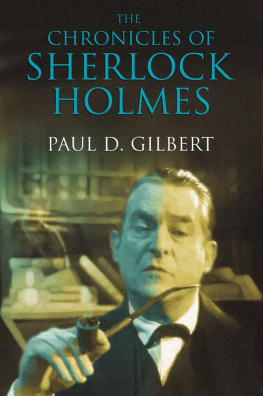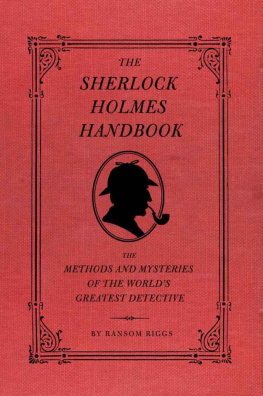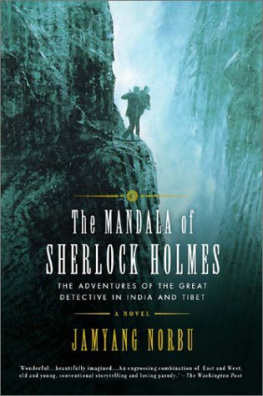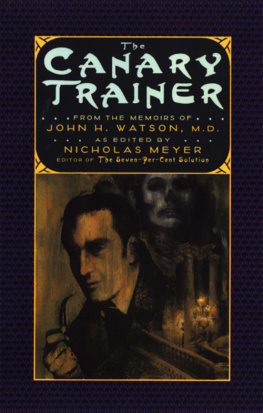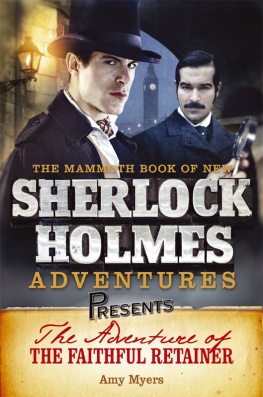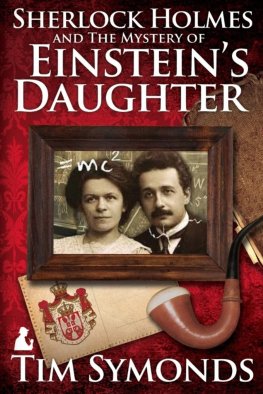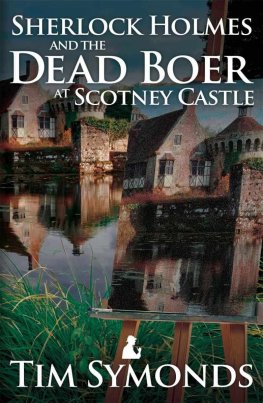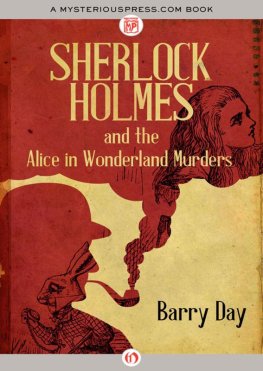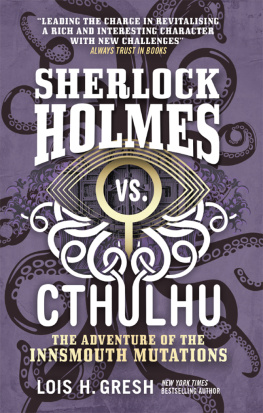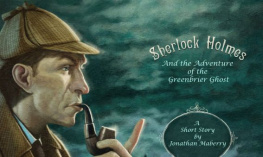D ear readers, as you are doubtless aware, throughout the narration of his sixty wonderful stories, Sir Arthur Conan Doyle made numerous passing references to past cases that were never to see the light of day as narratives in their own right. This has always seemed a shame to me, as some of the titles and premises offer intriguing opportunities and possibilities, (although others seemed to be humorous indulgences on his part). In compiling this, my second humble offering, I have selected those references that have presented me with the broadest possible canvas, i.e. those containing the least detail, and, therefore, enabling my imagination to run riot.
Holmes would have chastised me for my indulgence, Watson would have chastised himself for not having commended these tales to print. As for myself? Well, I shall be eternally grateful to Sir Arthur for his inspiration and to you, my readers, for your support and for providing me with the opportunity to present my second collection of stories. I sincerely hope that each one will satisfy the curiosities of all my fellow Sherlockians.
the colossal schemes of Baron Maupertuis are too recentin the minds of the public
he had succeeded where the police of three countrieshad failed he had out-manoeuvred, at every point, themost accomplished swindler in Europe.
(The Reigate Squires by A. Conan Doyle)
D uring the course of the weeks subsequent to our return from Rome, I must confess to becoming as obsessed with the subject of Moriartys impending revenge as had my friend, Sherlock Holmes. However, I was becoming a little surprised at the off-handed manner with which Holmes was now rejecting so many potentially satisfying and intriguing cases. As a result of our triumphant recovery of the statue known as the Dying Gaul, from the avaricious clutches of the infamous Professor, Holmess name was still ringing throughout the capital cities of Europe. Consequently we had become deluged with requests for consultations, from some of the continents most exalted houses. This rendered Holmess rejection of some of these cases the harder to comprehend.
As anyone who has read my record of that case will recall, it was during the longest section of our journey, the train from Paris to Turin, that Holmes finally broke his silence. He had then revealed to me how four years of investigation and deduction had resulted in the realization that it had been Moriartys brother, the Colonel, who had perished at the Reichenbach Falls in his stead. A gradual accumulation of evidence from across the continent, brought him to the conclusion that Moriarty was behind the theft of the statue The Dying Gaul from Romes Capitoline Museum. It was this realization that had now led to our current obsession.
Our time was now being constantly engaged either in scouring every newspaper, whether domestic or foreign, for news of noteworthy crimes, or ploughing through the endless reams of police reports that Holmes had requested from his continental colleagues and which were now engulfing our letterbox on a daily basis. Keeping our rooms in an orderly fashion had never been an easy task for our much put-upon landlady, Mrs Hudson, but the overlay of papers and files with which she was now frequently confronted reduced her to the point of despair and a stout refusal to re-enter our rooms until it was all cleared away.
Consequently all our meals were brought, by me, from the kitchen and our housekeeping was neglected to the point of dereliction. At last, when we were reduced to a situation whereby I was becoming anxious for our general well-being, I demanded that we should, at the least, dispose of the majority of the redundant newspapers and allow Mrs Hudson an opportunity to restore our rooms to something close to being habitable once again. Mercifully, Holmes made this small concession and Mrs Hudson returned to her former duties with a mixture of relief and disgust.
During the course of the throwing out of these journals I chanced upon a name that was, inexplicably, familiar to me. Unbeknown to Holmes, and against his explicit instructions, I had retained many of the letters and calling cards requesting his help or advice that he had rejected as being irrelevant to his quest for the elusive professor. Discreetly, within my room, I riffled through these in an effort to solve my mystery. In but a few minutes I had found the item in question, a small, elaborate white card announcing Lady Beasant of Belgravia. The words on its reverse, however, were what excited me:
A consultation regarding the Master Swindler would bemost appreciated. Please communicate with my secretaryat your very earliest convenience.
At the bottom of the note was a postscript:
Maupertuis must be stopped!
I raced into our sitting room in a state of great excitement, only to find a dishevelled Holmes in his armchair, an unlit pipe hanging, dejectedly from his thin lips.
Holmes! I exclaimed. Do you recall a certain article from the French press, regarding the notorious Baron Maupertuis?
I believe so, Holmes replied, with an exaggerated indifference that barely acknowledged my presence in the room.
Undeterred by this I hurriedly continued: Then you will also no doubt recall a report from your friend with the Salzburg police, which makes reference to a shadowy Austrian aristocrat who has incurred much rumour regarding his business dealings, perhaps even of his being connected to a murder?
Yes? Holmes now raised his eyes to me, summoning vague interest. I also remember rejecting these as worthless pieces of gossip, an assessment in which you do not seem to have concurred. Holmes answered, accusingly.
Well, it may prove to be just as well, for you also asked me to dispose of this. I tossed the card from Lady Beasant into his lap.
Holmes snapped the card into his hand and, after reading it slowly, turned it over again and again, while lost in his own thoughts. This is a piece of very expensive stationery. Not for the first time, Watson, we might be moving in very illustrious circles. However, there is no obvious connection between this Baron and Moriarty.
Perhaps not, but surely an interview with Lady Beasant might go some way to confirming this. After all, this is what we have been waiting for. A mysterious master criminal, operating in at least three separate countries!
Rumour and gossip, Watson, rumour and gossip. Holmes replied. None the less, he continued, there is much merit in the argument that you have made. There is certainly more likelihood of picking up Moriartys trail again if we take up Lady Beasants consultation, than if we sit here sucking pipes. Would you, Watson, reply to this on my behalf and arrange an immediate interview, while I put my toilet to rights. Oh, and ask Mrs Hudson to clear up this appalling mess!
I went about my errands with an enthusiasm born of the knowledge that Holmes was, once again, upon the trail of adventure an adventure that might conceivably lead us to Moriarty. However, at this point speculation was futile and the following afternoon found us pulling up outside a magnificent white pillared mansion in the heart of Mayfair, to interview a peeress of the realm.
In truth, the interior of this awe-inspiring pile was somewhat less impressive than its shell. Certainly the dcor and furnishings were of the most exquisite taste and quality, yet somehow there was a melancholy air about the place, a sense of slow and gradual decay. Notwithstanding this, one could still not fail to be impressed by the sheer scale and grandeur of a building, which at one time must have played host to dignitaries and ambassadors.

